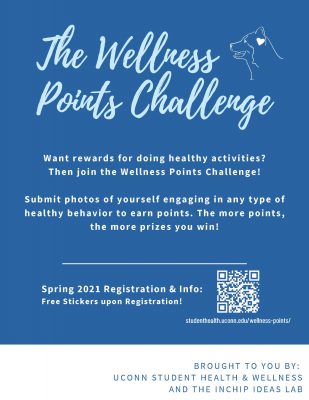
Student Health and Wellness Points Challenge
A challenge to build healthy habits for student health and wellness
About the Challenge
Student Health and Wellness would like to present the Wellness Points Challenge! This is a challenge to motivate students to develop healthy habits or be rewarded for those that do. The goal is to increase student wellbeing through an incentive process. Once you sign up, you will automatically receive a free laptop sticker. After that, you just submit a photo of yourself (or your ID) engaging in a healthy activity to earn points. The more points you have, the more prizes you receive! The top three point-leaders will each win an additional Amazon gift card, with $100 being the top prize. The challenge will run from January 25th to April 28th for the Spring 2021 semester. All UConn students are welcome to participate, including graduate, regional campus, and online students. Click on the link below for more information and to sign-up!
Registration and more info
This challange has concluded please go to the student health and wellness website to see more upcoming challenges and events: https://studenthealth.uconn.edu/
